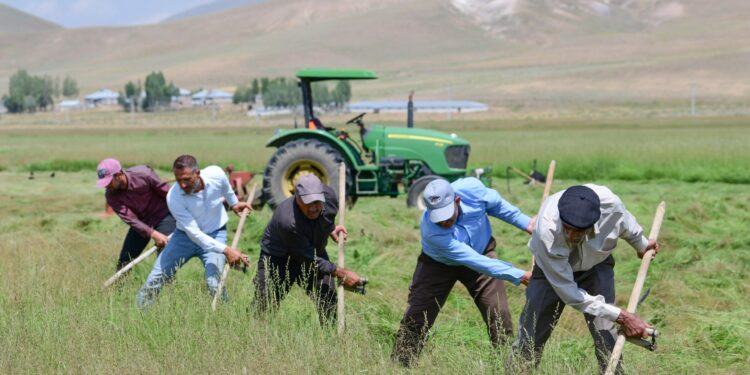Istanbul- Turkish Trade Minister Omer Bolat’s comments last week raised serious concerns about the future of Turkey’s agriculture and livestock sectors.
Bulat warned of the risks and challenges that these vital sectors may face as a result of the absence of migrant workers, explaining that the shortage of migrant workers could negatively affect productivity and sustainability in the agricultural and livestock sectors.
The minister said: “The absence of migrant labour poses a real threat to the agriculture and livestock sector. We need to find sustainable solutions that ensure the provision of the necessary labour to maintain the continuity and productivity of these sectors.”
He pointed out that agriculture and animal husbandry would stop if 25,000 Afghan shepherds left today, reflecting the scale of the problem.
sharp decline
The Turkish Statistical Institute announced the “livestock production statistics” for 2023, revealing a sharp decline in the number of livestock and sheep, which recorded its lowest level in 6 years, while the number of sheep reached its lowest level in 4 years.
According to the released data, the total number of cattle and sheep in Turkey decreased from 73 million 472 thousand 214 heads in 2022 to 69 million 106 thousand 753 heads in 2023, representing a decrease of 5.9%.
While the Turkish economy grew by 4.5% in 2023, the agricultural sector contracted by 0.2%.
The agricultural sector also recorded negative growth in two of the past three years, contracting by 3% in 2021, before recording a growth of 1.3% in 2022.
Turkish agriculture was the only sector that contracted among the various economic sectors in 2023, while the construction sector grew by 7.8%, the services sector by 6.4%, the real estate activities sector by 2.7%, and the industry sector by 0.8%.
Economic researcher Mohammed Al-Abdallah told Al Jazeera Net that the labor shortage crisis in the agricultural and livestock sectors is one of the most prominent reasons that led to the decline in the number of animals in Turkey.
Al-Abadilah explained that there are several other factors that contributed to this phenomenon, most notably:
- Import policies and their negative impact on local production.
- High input costs, especially feed.
- Inappropriate use of land for grazing.
- Population aging in rural areas.
Al-Abadilah stressed that addressing these factors requires strategic interventions by the government to support farmers and enhance local production.
Labor shortage
According to data from the Turkish Statistical Institute, the share of the agriculture and livestock sector in employment decreased from 15.8% in 2022 to 14.8% in 2023.
The institute’s statistics also indicate a significant decline in the number of workers in the agricultural sector over the past two decades.
In 2002, there were 7.458 million people working in agriculture, the number decreased to 6.745 million in 2011, and then to 4.974 million in 2021, reflecting a decline of 33% over the past 19 years and 26% over the last decade.
Statistics from the Ministry of Agriculture and Forestry indicate that the number of registered farmers decreased from about 2.18 million in 2001 to 2.17 million in 2021.
In this regard, writer Dilek Gungor says: “Although many young people living in the villages are unemployed, when you look for workers, no one comes forward. Even if they do come forward, they leave the next day. Everyone is used to rest, no one wants to do hard work, and they prefer to earn easy money.”
In an interview with Al Jazeera Net, farmer and shepherd Ashar Demirlar expressed his suffering in finding workers to care for his livestock, despite offering attractive salaries exceeding 40,000 Turkish liras ($1,200).
“Things have become unbearable,” he said. “We offer good salaries, food, housing and clothing, but we do not find anyone willing to work as a sponsor. Young people prefer to migrate to big cities and work for lower wages because of social security and civilian life. If this situation continues, I will have to rely on foreign workers or maybe I will just farm.”
He explained that the shortage of workers threatens the entire livestock sector in Turkey, adding: “Livestock raising is not just a job, it is a tradition that goes back centuries. If we cannot find someone to continue this work, we risk losing part of our cultural heritage.”
Demirlar noted that foreign workers may be a temporary solution, but he wondered how sustainable it would be. “Finding foreign workers may help fill the gap, but will they be willing to stay long term?” he said.
Foreign labor
Nihat Celik, head of the Central Union of Sheep and Goat Breeders of Turkey, said the government is working hard to solve the problem of shepherd shortage in the country, by holding talks with countries such as Afghanistan and the Turkic Republics to employ foreign shepherds.
He pointed out that there are about 40,000 foreign shepherds in Turkey, including Afghans, Syrians and Iraqis, expressing the sector’s need for an additional 150,000 shepherds.
For his part, the head of the Torbali Municipality Chamber of Agriculture in Izmir, Yilmaz Gergin, explained that the percentage of Syrian refugees working in agricultural lands has reached 95% in the region, noting that “the situation is no different throughout Turkey.”
In this context, economic researcher Haqi Erol Gun told Al Jazeera Net that the agricultural and animal husbandry sectors in Turkey will continue to need workers, explaining that the reason for this is due to the mentality adopted by Turkish youth today.
He warned of the impact of racist propaganda against refugees on these two already troubled sectors, stressing the need for the government to encourage young Turks to work in such jobs by providing them with the necessary support.
He added that coordination with the concerned countries to attract specialized workers will give employers a sense of security towards workers and guarantee the rights of foreign workers.



